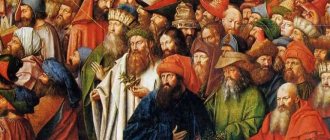Quotes from ancient Greek philosophers about life
It was ancient Greek philosophy that played a leading role in the formation of the philosophy of European countries. The sages of antiquity raised such important questions as:
- contrasting materialism with idealism;
- separation of rationalistic and empirical knowledge of the world;
- the essence of thinking;
- identifying the differences between a life of duty and a life of hedonism.
The philosophers of this time can be called: Epicurus and Aristotle, Pythagoras and Democritus, Demosthenes and Homer, as well as Plato. Ancient Greek philosophy includes Greek and Roman philosophy, which lasted a total of over a thousand years. In Ancient Greece, the development of this science was carried out by aristocrats, as well as travelers who brought writing from the Phoenicians.
The aphorisms of ancient Greek philosophers about life are of a different nature depending on which philosophical movement their authors belonged to. Thus, Homer wrote a lot about heroes, gods and immortality, accessible only to a few. Pythagoras, like the supporters of Orphism, considered life to be suffering for the soul and saw death as a deliverance from it. Moreover, in his opinion, with death occurs the transmigration of souls, or metempsychosis.
Followers of the Milesian school studied the origin of life on Earth in more detail. Many of them were convinced that the beginning of all things was fire, which lives forever, and everything that is generated by it is finite or mortal. Some sages argued that non-existence does not exist at all - there is only being.
Democritus described the human soul as full of warmth, which in itself is the fundamental principle of all living things. Moreover, everything living, in his opinion, is animated in different ways. The more warmth there is in the soul of a living being, the more perfect it is. The same philosopher assures that the afterlife is nothing more than a myth, since after death the soul scatters into many atoms and disappears. A deceased person stops holding these atoms within himself by breathing, and they scatter and mix with the atoms contained in the air.
The main idea of the Ancient Greek philosophy about life is that you need to live a full life and not be afraid of death. Resistance to death is meaningless, as is grieving for the departed. Man is the only creator of morality and laws, which are the main criteria of virtue.
The main precepts of the philosophers of this era are as follows:
- Everything in life should be done based on unconditional love.
- You should never lose heart, complain about fate or live in the past.
- You don’t need to recklessly believe everything that other people say, but you need to trust yourself in any situation.
- You should always keep your thoughts positive and not lose faith.
- When a situation becomes difficult, only within yourself can you find the strength to overcome it.
Thus, the ancient teaching about life is inseparable from the desire to overcome the fear of death. Subsequently, the immortality of the soul, which reduces the tragedy of death, was adopted by many religions.
Sayings of medieval philosophers
11th century AD
Abelard Pierre
* Logic pushed the world away from me.
* The truth must be kept secret in order to avoid its vulgarization.
>> Read all quotes: Abelard Pierre
Vladimir Monomakh
* Do not swear unnecessarily, but having taken an oath and kissed the cross, keep the oath firmly.
* Visit the patient. Bow down to the ashes of the dead, for we are all mortal.
>> Read all quotes: Vladimir Vsevolodovich Monomakh
Omar Khayyam
* “Hell and heaven are in heaven,” say the bigots. Having looked into myself, I was convinced of the lie: Hell and heaven are not circles in the palace of the universe, Hell and heaven are two halves of the soul.
* Nobility and meanness, courage and fear - Everything is inherent in our bodies from birth. Until death we will become neither better nor worse - We are the way Allah created us!
>> Read all quotes: Omar Khayyam
XII centuries AD
Anvari Auhad Ad-din
* Here are two things for you - do at least one of them, If you want to become famous for your actions before people - What you yourself know, pass on to others, Or what you don’t know, take from others!
>> Read all quotes: Anvari Auhad Ad-din
As-Samarkandi
* Blessed are those who suppress their Anger and forgive people.
* God created our distant world forever like this: Fun after troubles, good after bad.
>> Read all quotes: As-Samarkandi
Daniil Sharpener
* The rich man is known everywhere and has friends on the other side, but the poor man is hated on his own side.
* Every person is cunning and wise in the misfortune of others, but cannot understand his own.
>> Read all quotes: Daniil Zatochnik
Nizami Ganjavi
* If pain and suffering contribute to death, This is the will of a beneficent fate, believe.
* And everything that you create, that you strengthen with joy, will be your reward in your long life.
>> Read all quotes: Nizami Ganjavi
Rustaveli Shota
* This is why knowledge is given to people to strengthen their souls.
* If you don’t act, the ward will be of no use.
>> Read all quotes: Rustaveli Shota
XIII centuries AD
Abul Faraj
* Fools notice only people's faults and do not pay attention to their virtues. They are like flies that try to land only on the inflamed part of the body.
* A soul that lacks wisdom is dead. But if you enrich it with teaching, it will come to life, like an abandoned land on which rain has fallen.
>> Read all quotes: Abul Faraj
Bacon Roger
* The immortality of animals is in their offspring, while that of humans is in glory, merit and deeds.
* Prosperity best reveals a person’s vices, while adversity reveals his virtues.
>> Read all quotes: Roger Bacon
Dante Alighieri
* Deception and force are the weapons of the evil ones.
* The hottest corners of Vadu are reserved for those who remained neutral during times of greatest moral crisis.
>> Read all quotes: Dante Alighieri
Rumi Jalaluddin
* In the mirror, as you know, everything is the other way around. But without him we would never have seen ourselves!
* May retribution strike with disaster those who pay for friendship with enmity.
>> Read all quotes: Rumi Jalaluddin
Saadi
* It is best for a stupid person to remain silent, but if he knew this, he would not be a stupid person.
* Yes, I'm in the boat! The spill won't touch me! But how can I live when my people are drowning?
>> Read all quotes: Saadi Muslih ad-Din
XIV centuries AD
Boccaccio Giovanni
* Past actions are much easier to blame than to correct.
* Anyone who wants to be healthy is already partially recovering.
>> Read all quotes: Boccaccio Giovanni
Petrarch Francesco
* Human life on earth is not just military service, but combat.
* Over the course of my life, I have become convinced that conversations with friends take up the most and most imperceptible time; friends are great robbers of time.
>> Read all quotes: Francesco Petrarch
Hafiz Shems
* The word that you have kept is your servant; the word that escapes you is your master.
* To find peace in both worlds, follow two rules: be generous with friends, restrained with enemies.
>> Read all quotes: Hafiz Shems
Chaucer Geoffrey
* In high souls, pity is a frequent guest.
* Friends should live in complete harmony. Violence can stifle friendship.
>> Read all quotes: Chaucer Geoffrey
XV centuries AD
Ariosto Ludovico
* A person loses everything over the years: youth, beauty, health, impulses of ambition. And only one stupidity never leaves people.
* Cruelty is the product of an evil mind and often a cowardly heart.
>> Read all quotes: Ariosto Ludovico
Brant Sebastian
* And morality, inclinations, knowledge depend only on upbringing.
* Everything is transitory, fleeting, And only science is durable.
>> Read all quotes: Brant Sebastian
Guicciardini Francesco
* There cannot be long friendship, subordination, camaraderie where one does not adapt to the other.
* You cannot neglect your duty just for the fear of making enemies or not liking someone. Fulfilling a duty gives a person glory, the benefit of which is greater than the harm from a possible enemy.
>> Read all quotes: Guicciardini Francesco
Jami Abdurrahman
* Carelessness is the cause of all disasters.
* He who draws the sword of inhumanity will fall himself, struck down by the inhuman sword.
>> Read all quotes: Jami Abdurrahman
Da Vinci Leonardo
* Don’t feed the slacker bread, but let him reason, and you won’t deny him the ability to denigrate others. He is always ready to find an excuse for his own worthlessness.
* In nature, everything is wisely thought out and arranged, everyone must mind their own business, and in this wisdom lies the highest Justice of life.
>> Read all quotes: Da Vinci Leonardo
Luther Martin
* A lie always wriggles, like a snake, which is never straight, whether it crawls or lies at rest; only when she is dead is she straight and does not pretend.
* Love, like warmth, should warm on all sides and bend in response to any prayer of our brothers.
>> Read all quotes: Luther Martin
Margaret of Navarre
* If it turns out that the one you love is just like you and wants everything you want, in reality you will not love her, but only yourself.
* How unreasonable a person is when, out of the good he has, he still seeks another. Not being content with what he has and chasing more, he loses what he has.
>> Read all quotes: Margaret of Navarre
Machiavelli Niccolo
* Most people are happy with life as long as their honor or property is not harmed.
* War is the only duty that a ruler cannot assign to another.
>> Read all quotes: Machiavelli Niccolo
Buonarroti Michelangelo
*Thank God that I always desire more than I can achieve.
* Be each such a support for each other, so that, freeing each other from burdens, you can go towards one dream with one will.
>> Read all quotes: Buonarroti Michelangelo
More Thomas
* A sage will rather avoid diseases than choose remedies against them.
* There was no such terrible accusation for which there was no pretext.
>> Read all quotes: More Thomas
Navoi Alisher
* Those who have patience are able to create silk from leaves and honey from rose petals.
* A book is a teacher without pay or gratitude. Every moment she gives you revelations of wisdom. This is an interlocutor with a brain covered with skin, speaking silently about secret affairs.
>> Read all quotes: Navoi Alisher
Sachs Hans
* Having discovered kindness and affection, you will change your husband.
* It’s been this way for a long time in the world: He who is simple rushes to destruction!
>> Read all quotes: Hans Sachs
Ficino Marsilio
* Every thing in nature is either a cause directed towards us or an effect coming from us.
* When we talk about love, it must be understood as the desire for beauty, for this is the definition of love for all philosophers.
>> Read all quotes: Ficino Marsilio
Quotes from medieval philosophers
Medieval philosophy began its existence in the 5th century and ended in the 15th century. Its main element was an attempt to unite people divided into estates, classes, nationalities and occupations, with the help of a common religion - Christianity. Many philosophers were convinced that by becoming Christians, people would be able to become equal to each other in the future, afterlife, regardless of what their life on earth was like. Promotion of the idea of immortality is a distinctive feature of this time.
The attitude towards nature has changed. If ancient philosophy considered nature as a separate element of the universe, now in the Middle Ages it has become only a tool in the hands of man. Scientific study of it was suspended, people sought to use its wealth, thinking little about their replenishment.
Speaking about human self-awareness, it is important to note that the Middle Ages are a time when the main characteristic of a person becomes his will (in ancient times it was the mind). People who have not been able to subjugate their own will can realize goodness, but at the same time do evil. The poet's leading philosophical thought was that no one can defeat evil without God's help.
Philosophical thought went through three periods:
- The Apologetics period, when early Christian symbols and rituals were revised and the existence of God was proven;
- The Patristic Period is when the Catholic Christian Church began to dominate all spheres of people's lives in Europe;
- The Scholastic period is when the dogmas expressed by the sages of past years were revised.
The most famous thinkers of this era were Tatian, Origen, Boethius, Thomas Aquinas, John Chrysostom and others. Most of them were directly related to the church. Therefore, the phrases of various philosophers, known to us since the Middle Ages, were also originally conceived as related to religion.
Stages of development
Knowledge of the world in the Middle Ages was carried out exclusively through faith. This is a general characteristic of medieval philosophy and its main distinguishing feature from the philosophy of the previous period - antiquity, where skepticism and rationalism reigned in the concepts of the creation of the world.
Medieval philosophy developed in two main stages:
- Patristics. Initially, this term denoted literature compiled by spiritual mentors with a certain authority - the fathers of the church. After some time, the concept began to have a broader meaning and consist of four main characteristics: official acceptance of the church, holiness of life, orthodoxy of doctrine and antiquity. Philosophers did not reach this stage immediately; the source of patristics was apologetics. Apologists, in turn, used sharp arguments to defend and justify Christian dogma against its political and theoretical opponents. Objectively, they still completed their task - they prepared the ground for the creation of a new philosophy, but their harsh statements against philosophical truths were subsequently condemned by the council. Supporters of patristics made less harsh arguments; their main question was the relationship between religion and philosophy; they should not be opposed. At that time, Christianity reached its peak, which means that religion gained supremacy. It was necessary to decide whether to continue to intertwine and correlate it with philosophy or to reject philosophy as a teaching that harms faith.
- Scholasticism. The second stage in the development of medieval philosophy was the unification of the philosophy of Aristotle and Christian theology, that is, the period was characterized by a synthesis of theology and a rationalistic approach to the problems of philosophy. Hence the goal of scholasticism - to convey Christian teachings to ordinary people in an accessible way using rationalistic methods. Early scholasticism continued to consider the relationship between faith and knowledge. Philosophers of that time came to the conclusion that faith is religion, and knowledge is philosophy, therefore the two teachings, like the two sciences, remain indivisible. New main problems of medieval philosophy were highlighted - the harmonization of Aristotelian logic, the ontological problem of the existence of abstract objects (universals), the relationship of mysticism to religious experience. The early scholastic period gave rise to an interest in acquiring knowledge. Late scholasticism criticized the old schools, but no new ideas were introduced - this period is considered the time of decline of the philosophy of the Middle Ages. After this, medieval philosophy lost its former popularity, giving way to new philosophical teachings. However, some scientists secretly highlight the third mystical stage in the periodization of medieval philosophy. Mysticism is a summing up of the results of religious practice, the unity of man with God, and comprehension of the results. The teachings of mystics are distinguished by irrationality and some paradox.
Quotes from Renaissance Philosophers
The Renaissance began at the end of the 14th century in Western Europe, very quickly capturing all areas of knowledge - including philosophy. At this time, thinkers return to antiquity and revive ideas born in Ancient Greece and Ancient Rome. The era is divided into several stages:
- humanistic – when anthropocentrism was replaced by theocentrism;
- Neoplatonic;
- natural-philosophical.
The statements of thinkers at each of the above stages have their own characteristic features. In general, the Catholic Church began to have less influence on all spheres of people's lives and, as a result, split into Protestant and Catholic. Geographical discoveries made at this time also contributed to changing the picture of the world. The growing influence of science has led to an increasing number of philosophers beginning to believe that the world is organized rationally. Philosophy took a course towards heliocentrism (the idea of a world system with the Sun at the center), humanism, neoplatonism (a movement based on the ideas of Plato) and secularism (a proposal to separate the civil rights of people and the system of government from religion).
Prominent philosophers of the Renaissance were Dante Alighieri, Erasmus of Rotterdam, Boccaccio, Galileo Galilei, Machiavelli and others.
Quotes from modern philosophers
This period in philosophy began in the 17th century and lasted two centuries. Thinkers developed several directions:
- empiricism;
- rationalism;
- materialism;
- philosophy of education.
The names of the most famous thinkers of this era: Holbach and Leibniz, Hobbes and Bacon, Descartes and Voltaire, Rousseau and Montesquieu.
Science moves forward by leaps and bounds, making one discovery after another, and its laws also affect philosophy, turning it into an experimental science. Rationalism and empiricism become the main directions of its development thanks to the social and scientific revolutions. Knowledge based on logic on the one hand and subjective feelings on the other occupies thinkers. Many works are devoted to knowledge itself - its laws, essence, goals and possibilities.
Quotes from modern philosophers
Classics, but also modern philosophers, left many bright, wise sayings. The peculiarity of modern philosophy is that man is recognized as endowed with unlimited possibilities for knowledge and creativity. At the same time, forces should be directed not at the outside world, but primarily at oneself. As soon as he manages to become better himself, everything that surrounds him will change.
The most famous modern thinkers include: Vonnegut, Peirce, James, Freud, Camus and others.
Each of the listed philosophers contributed to the knowledge of the world and man - his soul and life. Through their quotes, everyone can get to know themselves better and find the right path.
Features and Characteristics
A characteristic feature of medieval philosophy is considered to be that, unlike ancient philosophy (which studied the universe and human nature during three stages of its development), it was based on theology and is closely connected with the doctrine of God and the Christian worldview. The following characteristic features of the philosophy of the Middle Ages are highlighted - the most important thing - briefly:
- Theocentrism is a religious and philosophical concept that determines that God is the creator of all things, the source of life and all goods. Philosophers who supported theocentrism considered the problems of man as a person, nature, and thinking only from the point of view that God is the center of being, a person above the world who created man, nature and everything else.
- Authoritarianism - philosophical teachings were of a religious nature and were closely associated with the church. Thus, the Holy Scripture or the Bible was not only a holy book for believers, but also a canon of thinking for philosophers. Answers to all questions of interest had to be sought there. The Bible was studied, quoted, commented on, but never criticized. All new ideas that differed from biblical teachings were suppressed.
- Traditionalism and retrospective thinking - denial of any new ideas, adherence to traditions. Innovation, creativity, individualism were suppressed and condemned; only ancient sources of knowledge could be trusted, and the older it was, the more authentic it was, and the more one could trust the truths contained in it.
- Commentary and exegesis. The commentary genre prevailed over the others, since the Holy Scripture was not amenable to either analysis or criticism. However, the Bible contained many incomprehensible, contradictory dogmas, and therefore Christian exegesis set themselves the task of interpreting sacred texts and tables in order to clarify all the contradictions and interpret them for the understanding of ordinary people.
- Didacticism. The general guidelines laid down in the Bible were in the nature of preaching, being moral teachings. They encouraged people to education, upbringing, and saving lives by joining religion and God.








